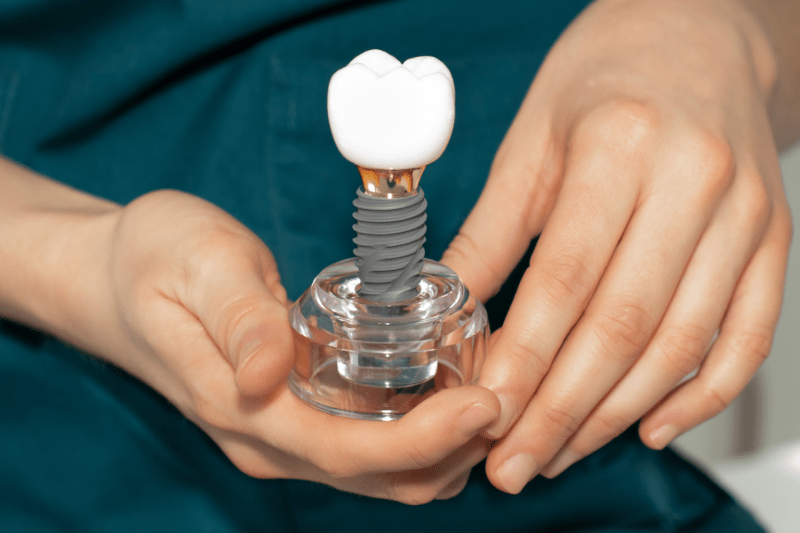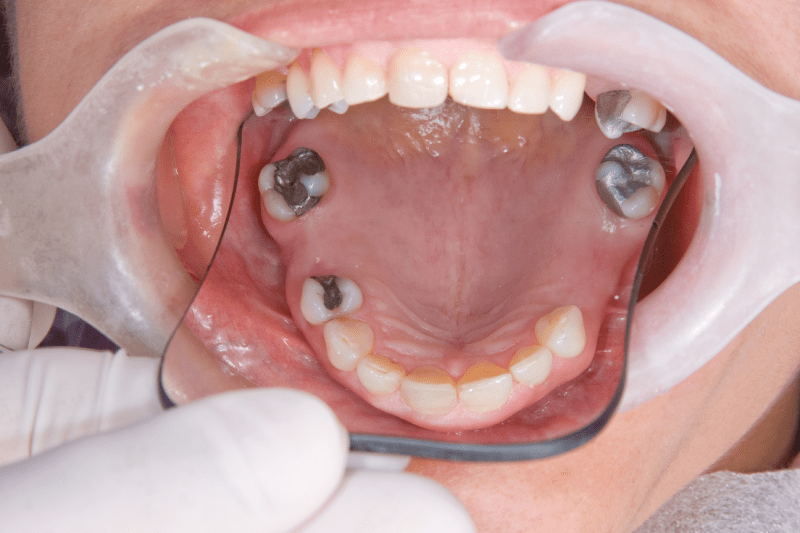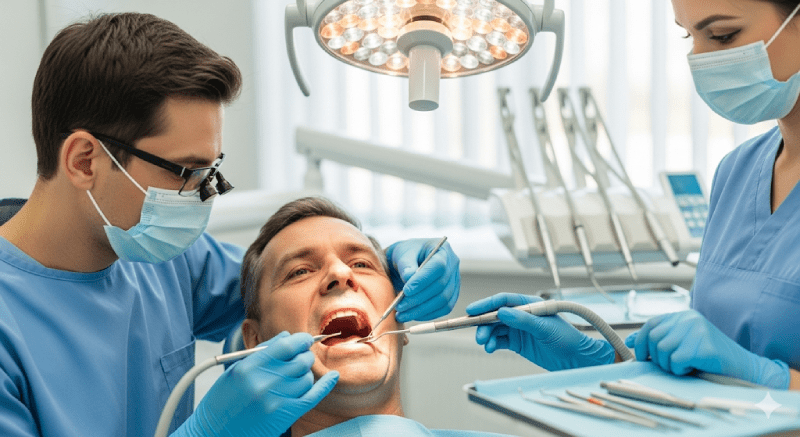What is a dental implant?
A dental implant is an artificial tooth root made of titanium or zirconium, placed into the jawbone to replace missing teeth. This root functions like a natural tooth, allowing for a porcelain crown, bridge, or denture to be placed on top of it. Implants fuse with the jawbone, creating a strong and permanent foundation. This way, patients regain both an aesthetic smile and their chewing function. Implants make it possible to replace even a single tooth without damaging neighboring healthy teeth, offering a stable and reliable solution for long-term oral health.
Who can get a dental implant?
Generally, suitable candidates for dental implants are individuals with healthy gums and sufficient jawbone density. The risks may be higher for smokers or those with uncontrolled diabetes or other serious chronic illnesses. An implant candidate is determined through a detailed examination by a dentist or surgeon. This examination evaluates factors such as the condition of the jawbone, general health history, and smoking habits. An implant is considered one of the most ideal and permanent solutions for replacing a lost tooth, providing excellent functionality and aesthetics.
How long does implant treatment take?
The duration of implant treatment varies depending on the patient’s condition and bone structure. The first stage involves placing the implant into the jawbone. After this surgical procedure, a waiting period of 2 to 6 months is necessary for the implant to fully fuse with the bone. This fusion process is called “osseointegration.” Once the implant has integrated with the bone, the stage of placing the prosthesis or crown begins. The total treatment process can take from 3 to 9 months, depending on the number of implants and whether additional procedures (like a bone graft) are needed.
Is implant treatment painful?
Implant treatment is generally performed under local anesthesia, so the patient does not feel any pain during the procedure. After the surgery, mild pain and swelling may occur. This can be easily controlled with painkillers recommended by the dentist. Most patients describe the pain they experience as less bothersome than a tooth extraction. Applying a cold compress during the first few days after the procedure helps to reduce swelling and discomfort, making the recovery process smoother.
What is the lifespan of implants?
Dental implants can last a lifetime if regular attention is paid to oral and dental health. The success rate is over 98%. The most important factors affecting the lifespan of an implant are the patient’s regular dental care, attending dental check-ups, and staying away from harmful habits like smoking. Maintaining the health of the gum and bone around the implant is vital for its longevity. Regular and proper care ensures that the implant functions just like a natural tooth.
How do implant prices vary?
Implant prices vary depending on the brand and quality of the implant used, the number of implants to be placed, the dentist’s experience, and the clinic’s location. Additionally, pre-implant procedures (bone graft, sinus lift) are factors that affect the price. To get a price estimate, a personalized treatment plan and cost breakdown should be requested from the dentist after a detailed examination. It’s important to remember that the most expensive option is not always the best one, as quality and experience are paramount.
Can people with bone loss get implants?
In patients with jawbone loss, there may not be enough bone volume to place an implant. However, this does not mean that an implant cannot be placed. Today, the missing bone tissue can be restored using bone grafting (bone powder) methods. The bone volume in the upper jaw can also be increased with surgical procedures like sinus lifting. These additional procedures may extend the treatment duration but provide the necessary foundation for a successful implant.

How does smoking affect implant success?
Smoking is one of the most significant factors negatively affecting implant success. Smoking reduces blood flow to the oral tissues, which makes it harder for the implant to fuse with the bone. It also increases the risk of infection and slows down the healing process. The risk of implant failure in smokers is higher than in non-smokers. Therefore, it is recommended that patients considering implant treatment quit smoking or at least reduce it during the treatment period to ensure the best possible outcome.
Is it right to get an implant for a single missing tooth?
Yes, for a single missing tooth, an implant is the best and most conservative treatment option. In traditional bridge prostheses, the healthy teeth next to the missing tooth must be filed down. An implant, however, is placed directly into the gap of the missing tooth without touching the neighboring teeth. This preserves the healthy tooth structure and results in a natural outcome. A single-tooth implant preserves the health of neighboring teeth in the long run and restores the chewing function naturally.
What should be the post-implant care?
Post-implant care is no different from the care given to natural teeth. Teeth should be brushed at least twice a day, and dental floss and an oral irrigator should be used. Regular and proper oral hygiene is very important to prevent infection around the implant. Additionally, regular dental check-ups should not be neglected to check the condition of the implant and for early diagnosis of potential problems. Proper care extends the life of the implant and maintains overall oral health.
When are dentures placed after the implant is placed?
After the implant placement procedure, the implant is expected to fully fuse with the jawbone. This process usually takes 2 to 6 months. This period depends on the bone’s healing rate and the stability of the implant. After osseointegration is complete, the prosthesis (crown or bridge) measurements are taken and it is placed. In some cases (like a single-tooth replacement), a temporary prosthesis can be placed immediately, but a wait is usually required for the permanent one.
Does the implant cause an allergy?
Since dental implants are generally made of titanium, which is biologically compatible, the risk of causing an allergy is very low. Titanium is a metal that does not react with body tissues and easily integrates with the bone. In very rare cases, a mild reaction may be seen around the implant in individuals with a titanium allergy. If such a situation is suspected, an allergy test can be done, and alternative materials like zirconium can be considered.
What is an implant screw and why is it important?
The implant screw is the implant itself and forms the artificial root part placed in the jawbone. This screw is the foundation for the prosthesis (crown or bridge) to be placed on top of the implant. The quality, material (usually titanium), and design of the screw directly affect the success of the implant’s fusion with the bone and its longevity. A successful implant treatment is based on a solid and high-quality screw.
Is implant treatment suitable for everyone?
Implant treatment is generally a suitable solution for many people, but some conditions may prevent an implant from being placed. Implant treatment can be risky for individuals with severe and uncontrolled diabetes, jawbones that have undergone radiation therapy, or serious health problems like osteoporosis. Therefore, the patient’s general health status is evaluated in detail before starting the treatment.
Can tooth extraction and implant be done at the same time?
Yes, in some suitable cases, tooth extraction and implant placement can be done in the same session. This procedure is called “immediate implant” or “single-session implant.” This method shortens the treatment time and speeds up the patient’s recovery process. However, this is only possible in situations with sufficient bone volume and no infection.
How is implant failure understood?
Implant failure is usually understood by signs such as the implant becoming loose, pain, swelling, or signs of infection around it. This situation can occur due to insufficient bone fusion, infection, or excessive loading. If detected early, the failed implant can be removed, and a new implant can be placed after the bone has had time to heal.
From what age can implant treatment be performed?
Implant treatment is applied to individuals whose jawbone development is complete. This age is generally around 16-17 for women and 18 for men. An implant placed before the jawbone has fully developed can lead to position changes that may affect chewing function and cause aesthetic problems later on.
What prostheses are placed on implants?
On top of implants, a porcelain crown can be placed for a single missing tooth, a bridge prosthesis for multiple missing teeth, or removable or fixed dentures in cases of complete edentulism. These prostheses are specially designed and custom-made to mimic the appearance and function of natural teeth.
Is an implant an artificial tooth?
An implant is an artificial tooth root placed in place of a missing tooth. The crown placed on top of it is the artificial tooth. So, the implant only forms the substructure, while the visible part is the crown. The combination of these two restores all the functions and aesthetics of the missing tooth.

How soon can teeth be used after implant placement?
After the implant placement, a healing period of 2-6 months is generally expected until the prosthesis is placed. During this waiting period, the implant should not be subjected to any load. After the permanent prosthesis is placed, patients can comfortably use their chewing function and return to their normal eating habits.
Do implants prevent MR imaging?
No, dental implants made of titanium do not prevent MR (Magnetic Resonance) imaging. Titanium is not a ferromagnetic metal, so it is not affected by the magnetic field of the MR device. Therefore, individuals with implants can safely have an MR scan.
How are implants placed on a toothless jaw?
In a completely toothless jaw, if there is sufficient bone support, all teeth can be replaced with a fixed prosthesis by placing 4 or 6 implants. This method is called “All-on-4” or “All-on-6”. This way, the patient does not need to use a removable prosthesis and can chew comfortably with a natural tooth sensation.
When can I eat after implant treatment?
After the implant is placed, no food should be consumed until the effect of the local anesthesia wears off in the first few hours. It is recommended to eat soft, non-hot, and easy-to-chew foods for the first few days. After the healing process is complete, a normal diet can be resumed.
How is the integration (fusion) of the implant with the jawbone ensured?
The integration of the implant with the jawbone is a natural process called “osseointegration.” In this process, bone cells grow towards the titanium surface, stabilizing the implant. For successful osseointegration, it is very important that the implant is placed in a sterile environment and is not subjected to excessive load during the healing period.
Is anesthesia required for the implant procedure?
Yes, the implant procedure is usually performed under local anesthesia. This means that only the area to be treated is numbed. If the patient has high anxiety or if multiple implants are to be placed, sedation or general anesthesia options can also be considered.
What are the long-term benefits of implant treatment?
Implant treatment provides many long-term benefits. By replacing missing teeth, chewing function and aesthetic appearance are restored. The implant prevents jawbone loss and prevents neighboring teeth from shifting. This helps preserve the structure of the mouth.
Do implants cause odor?
Correctly placed and well-maintained implants do not cause odor. Bad odor usually occurs due to bacterial plaque buildup and inflammation (peri-implantitis) around the implant. This situation can be prevented with regular and proper oral hygiene.
Does swelling occur after implant treatment?
Yes, mild to moderate swelling can be seen after the implant placement procedure. This swelling usually reaches its peak within the first 2-3 days and then decreases. Applying a cold compress and the medications recommended by the dentist help reduce the swelling.
What is done in cases of dental implant failure?
In case of implant failure, the implant must be removed, and the jawbone must be given time to heal. Then, after increasing the bone volume with additional procedures like a bone graft, a new implant can be considered for placement.

How should wound care be done after implant treatment?
Wound care after implant treatment is vital to prevent infection. Antibiotics and antiseptic mouthwashes recommended by the dentist should be used. The wound area should not be touched, and hard foods should be avoided. The mouth should not be rinsed within the first 24 hours.
Dental Implant Complications
Of course, as with many other treatments, it is normal for dental implant treatments to carry some risks. However, the risks in dental implant treatments will vary according to the doctors preferred by the patients. Because the complications of dental treatments they will receive from Norway dental clinics or Norway dentists will depend entirely on the experience and success of the dental clinic and surgeon. Dental implant treatments are not potentially risky treatments. Therefore, it is possible to experience some complications as a result of unsuccessful treatments. These complications may also include;
- Infection
- Bleeding
- Pain
- tooth sensitivity
- Incompatible dental prostheses
- Color mismatch
Norway Free Dental Implant Treatment
Norway is a country with an expensive cost of living. This is clearly seen if you look at the Norway dental implant prices. The fact that treatments are so expensive of course causes patients to research Norway dental implants for free or at affordable prices. Materials and attachments for dental implant treatments must be of high quality. This requires the use of original materials.
Precisely for this reason, dental implant treatments are generally more expensive than other treatments. Even those wishing to have dental implants at the best price in Norway should pay at least for the implant parts, which includes paying more than half the price. Therefore, it is more costly than other dental treatments. You should know that free dental implant treatments are not available in Norway. Insurance won’t cover it either. You can learn the necessary criteria by reading our content for Norway dental implants to be covered by insurance.
Norway dental implant price
You know that in the Norway healthcare system, treatments are paid at full cost. Regardless of the treatment, patients pay for the treatment first. They then get a report from Helfo to get a refund. It’s not a short process, but even if Helfo pays back it will be very little. For this reason, patients discover different ways of getting treatment. If you examine the Norway dental implant prices, you can save a lot by being treated abroad like many patients.
Because Norway dental implant prices start from € 2.650. That’s the price of a single tooth, isn’t it a lot? If a patient needs more than one dental implant, they will have to pay a small fortune. For this reason, it is better to have implant treatment abroad. What will be the best country for dental implant treatments? You can continue reading our content for detailed information.
Oslo dental implant price
Oslo, as the capital of Norway, is also a city that is frequently researched in dental implant treatments. For Oslo dental implants, if you need to look at Oslo dental clinics, you should know that there are dental clinics where you can get really good treatments. However, there is a problem that Oslo dental implant prices are not different from Norway dental implant price. Unfortunately, this will disappoint patients.
On average, Oslo dental implant prices start at €2,300. This is a fairly average price and extremely high compared to other cities. For this reason, many patients visit a different country for a few days instead of changing cities for dental implant treatments in Norway. This not only leads to much better prices, but also results in many successful treatments.
dental implant reimbursement
Dental implant treatments are not covered by insurance almost anywhere in the world. The insurance covers the treatment of missing teeth with alternative methods. So they don’t think you need dental implant treatments. They argue that you should use dental bridges instead. This means they avoid reimbursement for dental implant treatments. To be reimbursed for dental implant treatments in Norway you must have;
- Periodontitis (Deep gingivitis)
- Rare medical condition (SMT)
- Congenitally missing teeth
- Severe reduction in self-care ability
- Accident/trauma
- Toothless jaw
- Special medical conditions
- Tooth development disorders
Helfo Dental Implants
If we take a look at the Norway healthcare system, you will see that no treatment is free. This applies from the most severe treatments to the simplest treatments. Dental implant treatments are also one of the paid treatments. The Norway healthcare system operates with payment of the treatment fee and, if necessary, reimbursement from Helfo. For example, if a patient has lost two teeth, he pays the doctor in full for dental implant treatment. Then, at the end of the treatment, the dentist gives a report explaining the reason for the tooth loss.
If this report complies with the reimbursement conditions, the patient receives the dental implant reimbursement from Helfo with this report. However, you should know that even if he does, he will not be able to take the whole, he will only be able to take the price of 1 tooth. In order to receive Helfo dental implant reimbursement Norway, you should know that it is important that the dental implant that the patient receives is in a visible place. In other words, if the patient has received dental implants for his back teeth, neither will be paid.
Norway Affordable Ways to Get Dental Implants
Due to the high cost of living and paid treatment opportunities in Norway, unfortunately, it does not provide affordable dental implant treatments. For this reason, patients often travel to foreign countries and receive dental implant treatments. If you examine the Norway dental implant prices as we have given above, you will see that it will be more advantageous to receive laser treatment in different countries. That’s why you should know that the only way to get affordable dental implants in Norway is to get treatment abroad.
Turkey Dental Implant
Turkey is a country that is often preferred for dental holidays. With the extremely high exchange rate and low cost of living, if you get dental implant treatments in Turkey, you won’t have to get Helfo dental implant reimbursement! The success of Turkey dental clinics and Turkey dentists is known by the whole world. The fact that successful treatments can be obtained at extremely cheap prices will of course enable you to prefer dental implant treatments in Turkey instead of Norway dental clinics. If you are planning to receive dental implant treatment in Turkey, you can continue to read our content.
Turkey Dental Clinics
Dental clinics in Turkey are clinics that offer very successful treatments. When we look at the dental clinics in Turkey, it is possible to see that there are equipped, hygienic and comfortable clinics. Because Turkey is highly developed in the field of health. This makes it a frequently preferred country in terms of health tourism. You can also plan to have a dental implant in Turkey. This will be much more successful as well as being much better than Norway dental implant prices.
Thus, you will be able to receive treatment at more affordable prices than the Norwegian treatment costs. Since dental clinics in Turkey treat foreign patients all the time, they have concepts suitable for completely foreign patients. At the same time, nurses, doctors and secretaries working in Turkey dental clinics speak at least 2 foreign languages. This eliminates the communication problem needed while receiving dental implant treatment in Turkey.
Turkey Dental Implant Prices
Of course, implant treatment prices in Turkey will differ as in every country. Many factors will change the prices of dental implants, such as the implant brand you prefer, how many dental implants you need, and if you have problematic tooth roots such as root canal treatment and tooth extraction. For this reason, you will definitely need to contact the dental clinic in Turkey for a clear price. Otherwise, it will be difficult to get an exact price information.
However, as Cure Holiday, we are a company that provides service with the best price guarantee. For this reason, you can contact us to be treated at the best dental clinics in Turkey, with high quality standards, at the most affordable prices. As Cure Holiday, we provide dental implant treatments; It starts at 199€. Would you like to be treated with the best price guarantee?



